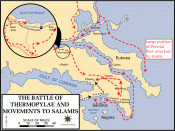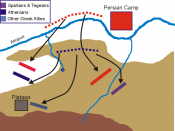The Persian Wars
In 519 BC Darius I ascended the throne of the expanding empire of
Persia. A group of people called the Ionians, lived along the coast of Asia
Minor. They were under Persian rule, having been conquered by Emperor
Cyrus (ruled 550-530 BC), and at this time were unhappy about their
conditions.
In 499 BC Aristagoras, the leader Miletus, one of the city-states,
organized a revolt of all the rest of the city-states along the coast. Darius
managed however, to subdue things in a five-year campaign. After this
long sought victory, Darius became bent on revenge against Athens, one of
the few states outside the area that had helped the rebles. He appealed to
Sparta to attack Athens from behind, but the Spartans saw straight
through his planned conquest of Greece and threw his envoy in a well.
The Persian army then landed at Marathon in 490 BC.
The 10,000
Athenian infantry were supported only by a small group of soldiers from
Plataea (Sparta procrastinated because it was in the middle of a festival),
but nevertheless the Athenians defeated the Persian archers and cavalry
through a series of ingenious maneuvers.
Darius died in 485 BC before his plans for another attempt reached
fruition, so it was left to his son Xerxes to fulfill his father's ambition of
conquering Greece. In 480 BC Xerxes gathered men from every nation of
his far-flung empire and launched a coordinated invasion by army and
navy, the size of which the world had never seen. The historian Herodotus
gave five million as the number of Persian soldiers. No doubt this was a
gross exaggeration, but it was obvious Xerxes intended to give the Greeks
more than a bloody nose.
The Persians dug a canal near present-day Ierissos so that their
navy could bypass...


